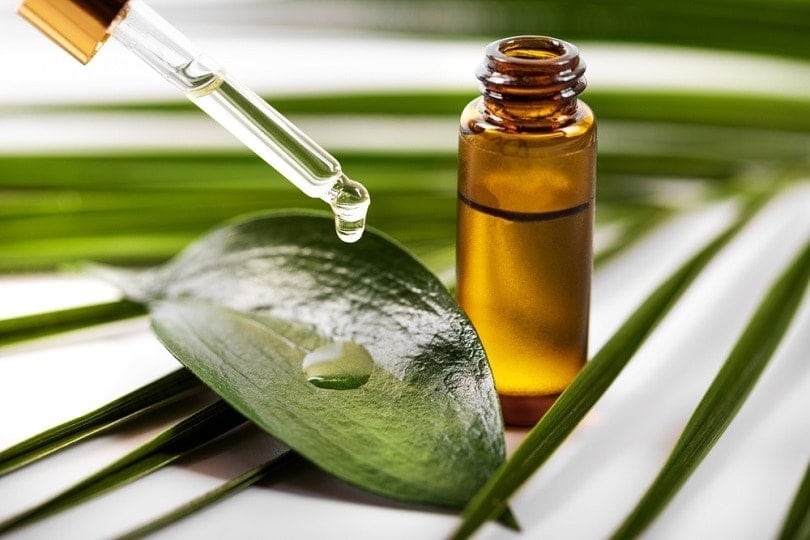Tea tree oil is often used for its antibacterial and antimicrobial properties but it should never be used on cats.
Holistic health practitioners often use a blend of traditional medical therapies as well as food, essential oils, teas, and aromatherapy to support wellness and relieve symptoms. With more and more people turning to alternative therapies, it’s important to understand the impact modalities such as essential oils can have on cats.
Unfortunately, it is poisonous to cats. Even small amounts of the oil can be fatal for kitties in high concentrations.

What Is Tea Tree Oil Commonly Used for in Humans?
Tea Tree oil comes from the Australian tea tree native to Southeastern Australia. It’s been used as medicine by First Nation members for millennia. Holistic medical practitioners use tea tree oil to fight acne, athlete’s foot, and fungal infections.
Many people also use it as a germ-killing antiseptic. Scientific studies suggest the oil can effectively treat acne, athlete’s foot, and dandruff. It can also be used with lavender to get rid of head lice. It’s used topically as the oil is toxic to humans when ingested1.

Can You Use Tea Tree Oil Topically in Cat?
The answer here is no. Tea tree oil is toxic to cats when ingested or used topically. The topical application of just seven drops of highly concentrated tea tree oil1 can cause severe poisoning in cats. Cats absorb the toxin through their skin, and kitties also tend to lick themselves, resulting in ingestion.
If you’re looking for a good, cat-friendly antiseptic, it’s best to stick with chlorhexidine and iodine for treating your cat’s superficial nicks and cuts. Alcohol and peroxide, while safe for humans, are both problematic for your feline buddy as both can damage your cat’s delicate skin and the vulnerable tissues underneath.
Pet shampoos with less than 1-2% tea tree oil are generally considered safe as long as label instructions are followed.
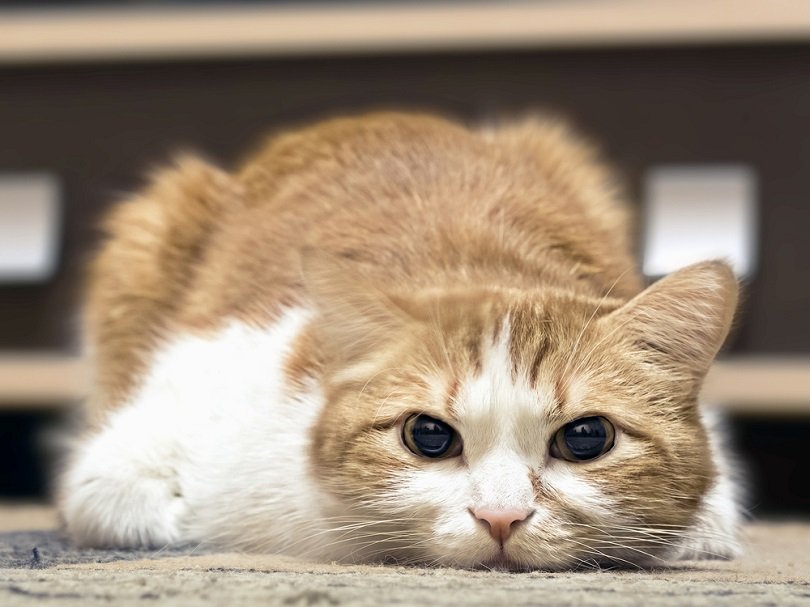
What Are The Signs of Tea Tree Poisoning in Cats?
Cats exposed to tea tree oil often start to hypersalivate and then may become weak and uncoordinated; some have trouble walking and lose the ability to control their hindquarters. Tremors can occur even when kitties have been exposed to relatively low doses of tea tree oil. Ultimately, consumption of or exposure to even small quantities of tea tree oil can lead to liver failure and even death in cats.
Highly concentrated products tend to be the most dangerous for cats. Exposure to as little as 10 millimeters of highly concentrated (100%) tea tree oil has resulted in death in some cats.
While tea tree oil is particularly toxic to cats, it’s important to remember that almost all essential oils are toxic to felines. Your cat lacks the liver enzymes required to break down essential oils, meaning that exposure to even small amounts of these products can quickly lead to serious problems.
Cats have even been known to display the signs of essential oil poisoning from inhaling the droplets from an atomizer. Keep in mind that some cases of essential oil poisoning come after a pet knocks over a human product and samples the oil or walks through it and ends up licking the product from its paws.
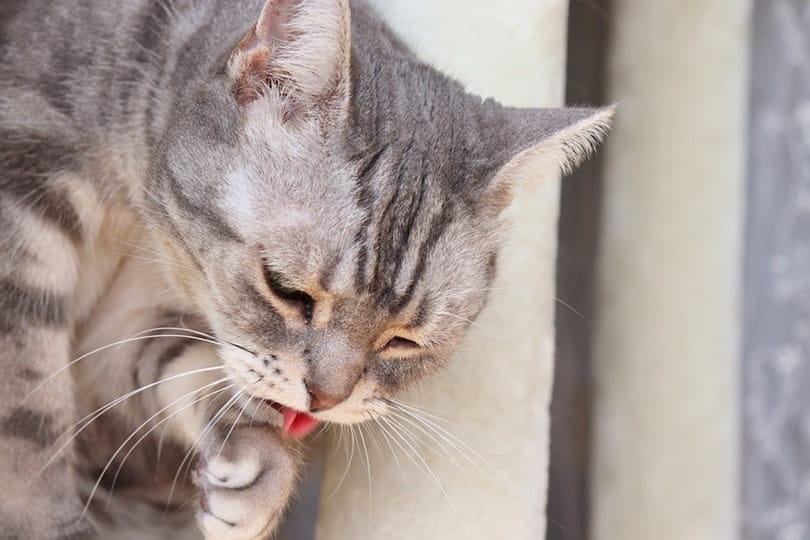
How Is Tea Tree Oil Poisoning Treated?
There’s no antidote you or the veterinarian can give to treat tea tree oil poisoning. They will need veterinary treatment and support while the body clears the oil from their system.
Call your cat’s veterinarian immediately for guidance if you suspect your pet accidentally got into your tea tree oil. Make sure to have the bottle on hand when you call to provide your veterinarian with essential information, including all the ingredients and the product’s concentration.
You’ll also want to let the veterinarian know how much your furry friend consumed and when and if your pet exhibits any symptoms such as confusion, lethargy, or difficulty walking.
While there’s no cure for tea tree poisoning, there are several things veterinarians can do to make your cat more comfortable and improve its chances of survival, including providing IV fluids and keeping your cat nice and warm. Both are essential to your cat’s survival if exposed to the toxin.
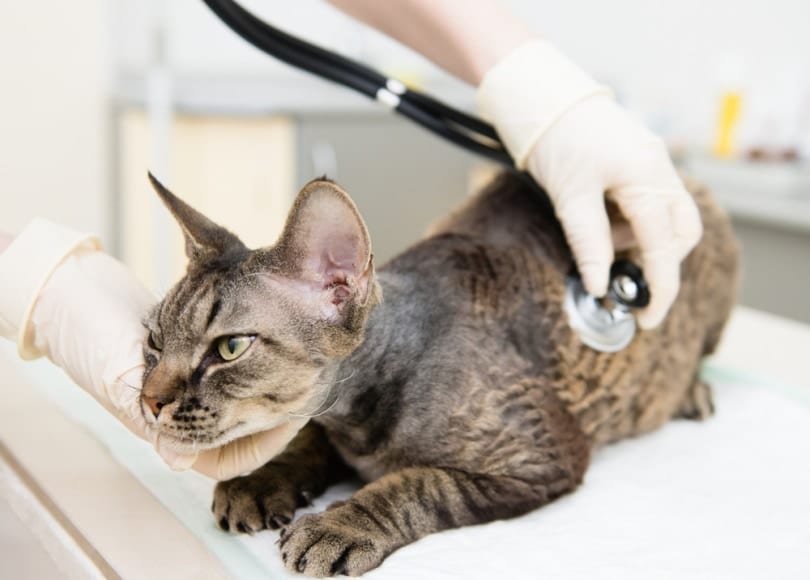
Does the Scent of Tea Tree Oil Repel Cats?
There’s some evidence that cats don’t like the strong scent of tea tree oil, but it’s never appropriate to use any essential oil as a cat repellent due to the toxicity these products have and the serious consequences that follow when a kitty is exposed to even small amounts of the products. So while the scent of tea tree oil may be unpleasant to cats, it should not be used to keep your cat away from your sofa or out of your garden.
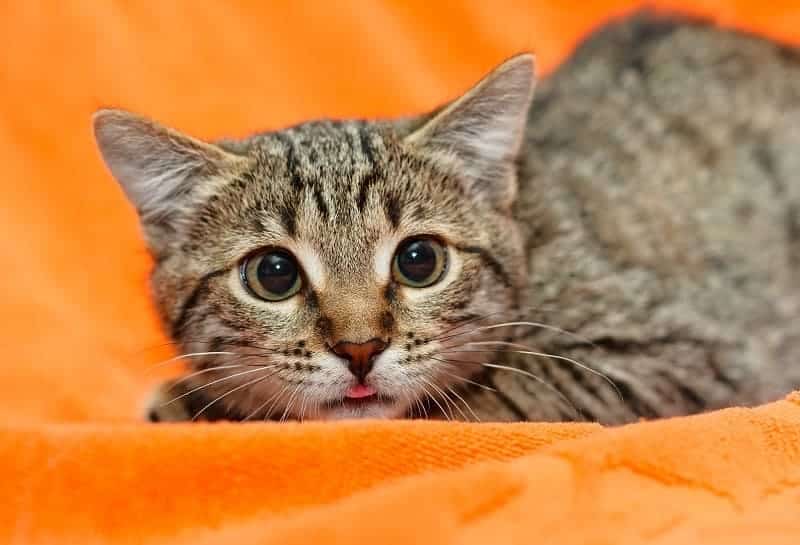

Conclusion
While tea tree oil offers several benefits for humans, it is toxic to cats. Your cat can suffer from tea tree oil poisoning after inhaling or ingesting even a tiny amount of the 100% oil. Even topical products can harm your pet. Tea tree oil and cats simply don’t mix.
Featured Image Credit: ronstik, Shutterstock

